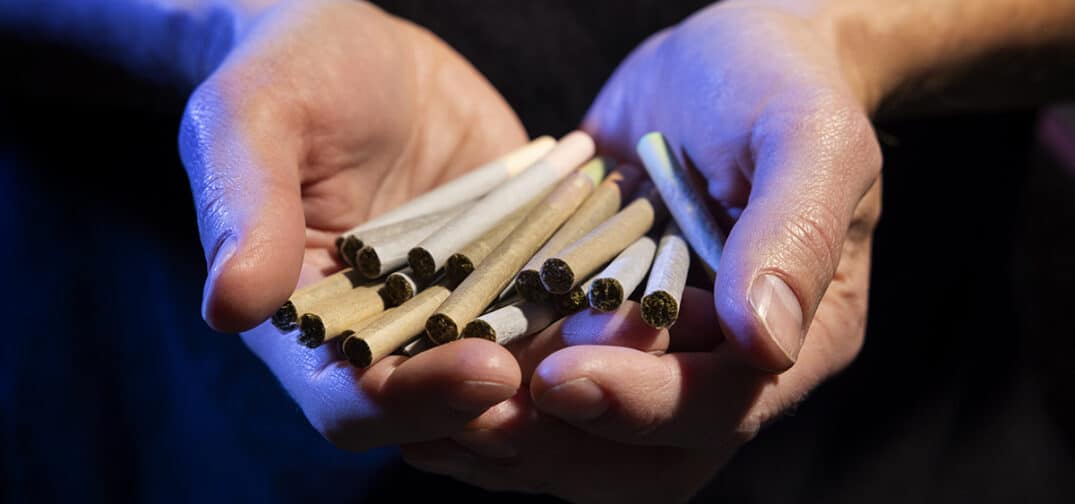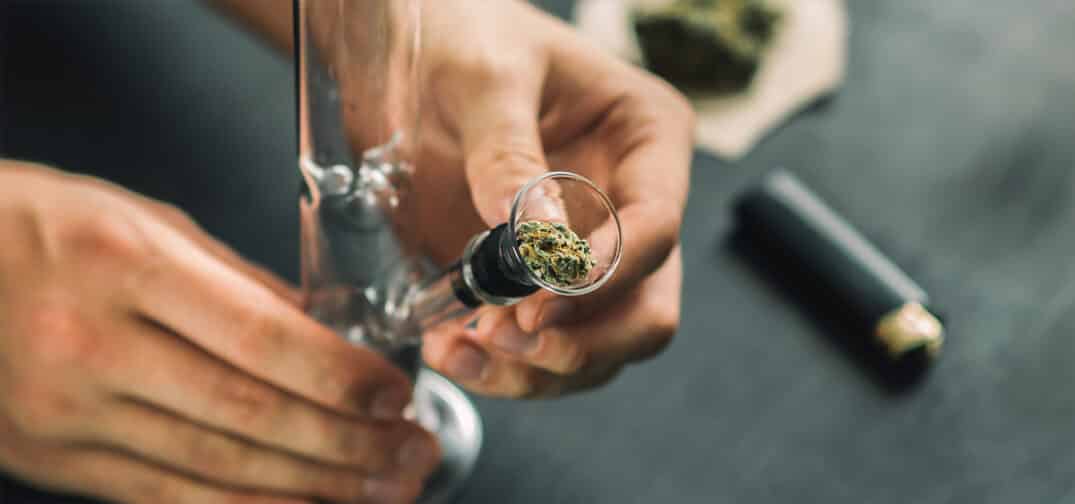The humble pre-roll is perhaps the most approachable and ubiquitous consumer product in the cannabis industry — when made properly and with high-quality ingredients, pre-rolls can be the perfect treat for seasoned consumers and rookies alike.
In this written Q&A, Harrison Bard and Fredrik Rading, the co-founders of Custom Cones USA, discuss the business advantages of offering pre-rolls, the evolution of pre-roll technology, and misconceptions about the product offering. The interview also covers consumer demographics for preroll purchases, Harrison and Fredrik’s predictions for the future of the pre-rolls industry, and more!
Scroll down to read the full interview.
Ganjapreneur: For cannabis producers, processors, and vertically integrated businesses, what are some of the benefits of offering pre-rolls as a product line?
Harrison Bard (HB): Vertically integrated companies have the ability to earn higher margins, as long as they are able to operate efficiently. Based on our research conducted with Headset, we found that house brands typically earn between 5%-9% higher margins, with Colorado house brands earning up to 12.7% higher margins so far in 2023.
Fredrik Rading (FR): Pre-rolls in general produce higher margins compared to other product categories due to their low production costs. Vertically integrated operators have the ability to earn even higher margins by cutting out the middleman and running more in-store promotions on pre-rolls without hurting their bottom line.
HB: Pre-rolls are one of the most popular add-on items at the point of sale. Headset data tells us that when a customer purchases flower, vape products, edibles, or a beverage, they will add-on a pre-roll 15.5% to 23.3% of the time. In fact, in every one of these product segments, pre-rolls either have the highest attachment rate or are within a single percentage point of the leader. Vertically integrated companies control both the product and the messaging at the point of sale, so they have the ability to really drive sales.
One of the common trends across all state cannabis markets right now is that many producers are struggling financially. Compared to other types of cannabis products, how cost-effective are pre-rolls for manufacturers?
FR: One of the best things about pre-roll production is how inexpensive it is compared to growing flower, making edibles, or extracting concentrates. You don’t need a lot of space or expensive equipment, and you avoid the risks that come with cannabis production. With growing, if one thing goes wrong you can lose an entire harvest. For pre-roll production, you can just buy flower from trusted growers and avoid the stress and added expense. Extraction equipment is very expensive and requires special rooms built to strict codes, and edibles require a commercial kitchen with lots of equipment. A starter kit that includes all the pre-roll machines you need to produce thousands of pre-rolls per shift can be purchased for under $6,000. The only added expense is a table for the equipment to sit on and the pre-rolled cones.
HB: Pre-rolls also have the least amount of price compression in the industry. The Headset data shows average pre-roll prices are down 11% in the US, which is the least of all categories. On the other hand, flower prices are down 24% on average across the country. We know that pre-roll multi-packs further decrease your labor and packaging costs, as you don’t need to individually package each pre-roll. So, from a purely financial standpoint, pre-rolls make the most sense to expand into compared to any other product category.
What are some of the different options that a brand has when venturing into the pre-roll category?
FR: There are so many! Pre-rolls are the most customizable category in the cannabis industry. Brands have the ability to showcase specific cultivars and are presented with a plethora of choices when it comes to the size, shape, paper type, filter type, packaging, and branding of their pre-rolls.
HB: Infused pre-rolls are currently the fastest growing segment in the pre-roll market with an impressive year-over-year growth of 1,426% in Canada and 22% in the US. Multi-packs, mini pre-rolls, hemp blunt wraps, and high-end pre-rolls with glass/wood/ceramic filter tips are also gaining popularity. When you consider that cannabis sales in 2022 were down by -1% in the US and slowed to 7% growth in Canada, it makes the growth in the pre-roll market even more significant.
FR: As pre-rolls become more popular, consumers are looking for new options and producers are trying their best to keep up with demand. The leading pre-roll companies offer multiple lines of pre-rolls in order to reach a larger demographic by offering different price points and smoking experiences.
Do automated pre-roll machines work more efficiently than manual pre-roll loaders? How does a manufacturer know when to make the switch from manual to automated?
HB: We typically recommend thinking about automated pre-roll machines once you are at 50k to 100k pre-rolls sold per month. However, there are a lot of limitations when it comes to using automated pre-roll machines and they are not as easy as just pushing a button and walking away. Compared to making about two to three thousand pre-rolls per 8-hour shift with one tabletop pre-roll machine, you can produce about one to two thousand pre-rolls per hour on an automated machine.
FR: However, automated machines are extremely finnicky and you will need to both grind your cannabis finer than you normally do, as well as dry out your flower to a lower moisture content. If you are not carefully monitoring and controlling the particle size and moisture content of your flower – you are not ready to bring in automation. Also, if you want to use the freshest, stickiest materials, automation is not the way to go.
HB: These machines can make one type of pre-roll exceptionally fast, but it takes time to configure them for a new project. Operators must consider the impact of shutting down for repairs or cleaning, when you have to stop the machine to create a different type of pre-roll, you are losing productivity. The benefit of using smaller, manual filling machines is that they can easily be adjusted, and, if you can have multiple of them, production doesn’t stop when one goes down, needs cleaning, or needs to be adjusted for a different type of pre-roll. There’s now also automation to just infuse the pre-rolls, so you can infuse any type and size of joint, regardless of how it was made.
FR: Also, when you are first setting up your pre-roll brand, you’ll want to experiment with packaging sizes to determine what price points generate the most sales in your market. Automated machines don’t allow you that flexibility, so launching with smaller, table-top pre-roll machines makes sense when starting out, so you can discover and hone in on exactly what your product portfolio will be.
How has the popularity of pre-rolls among consumers changed over the past few years, and what do you foresee for this category over the next 3-5 years?
HB: When the first medical markets started opening, the price of flower was high and producers did not have an easy way to create pre-rolls. Pre-rolls were not as popular amongst consumers, so they unfortunately became a place for producers to put their trim and shake. As markets matured, the price of flower went down and more machines were made that allowed producers to easily create better pre-rolls. This created a situation where the quality of pre-rolls rose, and the price dropped, making pre-roll sales skyrocket.
FR: Pre-rolls used to be the fourth or fifth biggest category, but they are now a strong second to pure flower in Canada and third in the US behind vapes. New pre-roll products are constantly being created, and producers are always looking for new shapes, flavors, papers, and filters to grab the consumers’ attention.
HB: Another interesting point about pre-rolls and consumer preferences is that each state goes through a distinctive product lifecycle for pre-rolls after legalization. During the first 1-2 years, 1-gram 109mm pre-rolls will dominate the market. Since the price of flower in new markets is high, the cost to produce multi-packs results in very high costs for the consumer and producer. As the price of flower and subsequently oil comes down in the next 3-4 years, you’ll begin to see pre-roll multi packs and particularly infused pre-roll multi-packs blossom and take a larger percentage of the market share.
Which consumer demographics tend to purchase pre-rolls the most?
FR: An interesting thing about pre-rolls is that, when it comes to wallet share, they are the most consistent product segment across all age demographics. Whereas other products either show a significant increase or decrease in popularity with each new generation, pre-rolls steadily hover between 12.8% and 14.5% in each.
For example, two of the most popular products for older generations to purchase are flower and edibles, but both of those become noticeably less and less popular with each new generation. Younger generations prefer to spend their money on vape products, so much so that vape products have actually overtaken flower as the biggest category for the Gen Z demographic! You’ll also notice that wellness products like capsules and topicals are more popular with older generations.
HB: These trends in market share make perfect sense. Of course, older generations would be more interested in wellness products, as life tends to get more uncomfortable with age. It also makes sense that vaping would be more popular with the younger crowd, as they highly value convenience and older generations are not as used to the vape format. Pre-rolls break the trend and continue to remain a consistent part of every generation’s purchasing habits, and that is yet another reason why the pre-roll category as a whole continues to grow.
Among diehard connoisseurs, cannabis pre-rolls have occasionally been lampooned for containing mostly shake or low-quality flower. Do you foresee this stereotype being invalidated as more brands invest in higher-quality pre-rolls, or will there always be a division in the market between “cheap” pre-rolls and “high-end” pre-rolls?
FR: As with most things, like coffee, wine, and beer for example, there will always be a cheap $1-$3 option, mid-level options, and higher-end craft options. Right now, there are lots of companies that are completely devoted to making high-quality pre-rolls, but there are also pre-roll companies selling hundreds of thousands of $1-$3 pre-rolls. Like any type of cannabis product, there is always going to be an economically focused selection. In other words, low quality pre-rolls will be a choice instead of the norm.
HB: The division between cheap and high-end pre-rolls will be distinguished by product innovation as more pre-roll producers create infused and non-infused pre-rolls with premium materials like ceramic tips, wood filters, and special paper types that are difficult, if not impossible, for consumers to roll at home. When die-hard consumers, who would otherwise never buy pre-rolls, start to see product innovation and formats they can’t easily roll themselves at an affordable price, pre-rolls will earn even more market share.
What do you think the pre-roll category will look like after federal legalization?
FR: Federal legalization will allow the pre-roll category, and the cannabis industry overall, to function like any other regulated industry. New automated machinery will continue to be invented to make pre-roll production more efficient, and brands will start to consolidate as the market expands across the world. However, craft brands will still thrive, but just like in craft beer, these niche brands will get acquired by and merge with large MSOs and LPs.
HB: I know it’s a nightmare scenario for most cannabis professionals, but federal legalization will probably pave the way for big tobacco to become leaders in the pre-roll industry. They already have billions invested in cannabis, they have all their distribution channels already in place, and they have the resources necessary to impact policy and production. One-way brands can stay ahead of tobacco companies is by continuing to develop customer loyalty through product innovations. Launch creative new products and smoking experiences at a faster rate than a multi-billion dollar operator. It’s not impossible when you have an advantage over knowing the ins and outs of the cannabis industry and are closer to the customer.
Who are some brands that you think are doing an exceptional job in the pre-roll category right now, and why do they stand out?
FR: Jeeter does an excellent job with branding and marketing, quickly becoming the number one pre-roll in California and many other new states. If there is a niche in the pre-roll market, you can bet that Jeeter has a product in that category, like flavored, infused, glass tipped, and mini pre-rolls.
HB: Juicy Joints is a Washington brand that exclusively produces pre-rolls. They focus on keeping prices low and potency levels high. They offer a wide range of flavored and infused pre-rolls, which consumers love. Mixing low prices, high cannabinoid percentages, and flavored products has been a winning formula in the cannabis industry, and they’re doing it really well.
FR: If you are looking for a craft cannabis brand that focuses on producing the best pre-rolls, you can’t go wrong with Fire Bros. As one of the premiere growers in the state of Washington, Fire Bros. has a reputation for making high quality pre-rolls. Their most recent offering is a multi-pack of five pre-rolls that allows you to get either a single cultivar or a variety.
Thank you, Harrison and Fredrik, for answering our questions! Our readers can visit CustomConesUSA.com to get in touch or learn more.

























